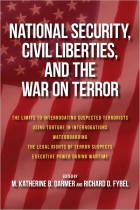Edited by Katherine B. Darmer and Richard D. Fybel
Prometheus Books, $21.00, 478 pages
In 100 years, when historians are trying to decipher the incomparable mess that the American response to the terror attacks of September 11, 2001 created, they will need books like National Security, Civil Liberties, and the War on Terror to help them. Darmer and Fybel have assembled 31 scholarly essays within a broad range of national security-related topics. This book is not for the general reader, the essays presume you already know your way around a writ of Habeas Corpus. While there are many footnotes, the very nature of the legal scholarship makes a thorough examination of source and secondary materials impossible to fit in one volume. In the interest of brevity, the editors have wisely limited many of the footnotes.
The essays fit into 5 categories: 1) Framing the War on Terror: History and Context, 2) Interrogation Practice: From Torture to Miranda Warnings, 3) Immigration and Racial Profiling, 4) Secrecy and Surveillance, and 5) Detentions and the Constitutional Balance of Power.
Whatever your personal beliefs are with regards to “enhanced interrogation” (Torture), or the Bush-era policies that suspended Habeas Corpus rights for terror detainees, National Security, Civil Liberties, and the War on Terror is a timely collection of legal philosophy; it even considers the implications of the recent death of Osama bin Laden. This book is a necessary addition to the library of any lawyer, law school student, or any student of 20th century American history.
Reviewed by Bradley Wright

